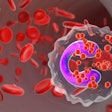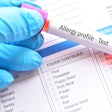
A new scientific review is shedding light on the pivotal role of airway epithelial cells in the development and progression of severe asthma (SA), offering promising avenues for more personalized and effective treatments.
Airway epithelial cells, long recognized as the body’s first line of defense against inhaled pathogens, are now being understood as key regulators of immune responses. These cells produce a diverse array of cytokines, signaling proteins that orchestrate immune activity that play a central role in both initiating and sustaining inflammation in asthma. This breakthrough in severe asthma research was detailed in the study, “Epithelial-Derived Cytokines in the Pathogenesis of Severe Asthma,” recently published in Frontiers in Allergy.
The study categorizes epithelial-derived cytokines into four major groups:
- Alarmins (IL-25, IL-33, TSLP) are rapidly released upon epithelial injury, activating immune cells and kickstarting inflammatory responses.
- Proinflammatory cytokines (IL-1, IL-6, TNF-α) intensify inflammation by promoting immune cell activation.
- Chemokines (CCL2, CCL5) guide immune cells to sites of injury.
- Antiviral cytokines (IFN-α, IFN-β, IFN-λ) enhance epithelial defenses against viral infections.
In severe asthma, cytokines are instrumental in driving type 2 (T2) inflammation, characterized by elevated IL-4, IL-5 and IL-13 levels, leading to eosinophilia, increased IgE and heightened airway hyperresponsiveness. They also contribute to non-T2 inflammation, which includes more treatment-resistant forms of asthma.
The study emphasized the growing importance of targeting epithelial cytokines for therapeutic intervention. Notably, researchers noted that tezepelumab, an anti-TSLP biologic, has shown success in reducing asthma exacerbations and improving lung function. Meanwhile, experimental therapies targeting IL-25 and IL-33 are showing promise in preclinical trials, although the study’s authors said more clinical data is needed.
Researchers encouraged further research into cytokine-specific pathways, combination therapies and inhaled biologics to enhance treatment efficacy while minimizing side effects. According to researchers, large-scale clinical trials focusing on non-T2 phenotypes and epithelial-driven airway remodeling are seen as critical next steps in the evolution of asthma care.
This emerging understanding of epithelial-derived cytokines marks a significant shift in asthma research, potentially transforming how severe asthma is diagnosed, managed and treated.























